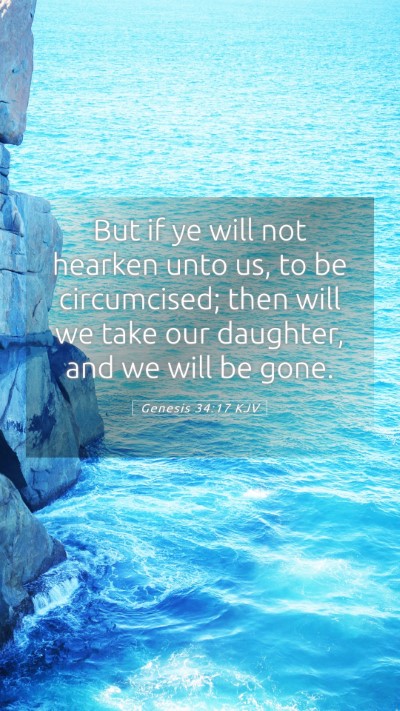Bible Verse Commentary: Genesis 34:17
The verse Genesis 34:17 states:
"But if you will not hearken unto us, to be circumcised; then will we take our daughter, and we will be gone."
This verse occurs within the narrative of Dinah, Jacob's daughter, and her interactions with the Shechemites following her abduction. The context is crucial for understanding the implications of this dialogue between Jacob's sons and Hamor, the father of Shechem. Below is a combined summary of insights from respected public domain commentaries on this verse.
Understanding Genesis 34:17
Contextual Overview:
The actions surrounding Dinah set the stage for discussions of covenant, identity, and community purity. The proposal of circumcision served as a pivotal moment that involved both cultural and spiritual dimensions.
Insights from Commentators
- Matthew Henry: He emphasizes the seriousness of the situation as Dinah had been violated, and her brothers sought not only justice but also a means to secure their sister's honor. Henry notes that circumcision was a sign of the covenant between God and Abraham's descendants, thus relating it to the larger biblical narrative of covenantal faithfulness.
- Albert Barnes: Barnes discusses the rationale behind the sons' response. He suggests that they were using the institution of circumcision as a means to gain leverage. The act was not only a religious duty but a strategic move to dispose of any potential hostility from the Shechemites, turning a matter of personal affront into one of communal obligation.
- Adam Clarke: Clarke points out the theological implications of nahal (to take away) versus rape. He proposes that the response of the brothers reflects a desire to both redeem their sister and return to a proper relationship with the community, albeit through a devious means. He also highlights that such a requirement could potentially unite the two peoples but could also lead to deeper mistrust and reconciliation issues.
Thematic Elements
Genesis 34:17 highlights several themes significant in broader biblical study:
- Covenantal Identity: The call to circumcision placed the Shechemites in a position to align with the covenant people, which reveals insights about the boundaries of God's chosen people.
- Justice and Retribution: Dinah's brothers’ response is marked by a desire for justice, echoing the themes of retribution found throughout the Old Testament.
- Cultural Clashes: The interactions highlight the tensions between the Israelites and their neighbors, illustrating early conflicts that serve as a backdrop for much of Israel's narrative in Scripture.
Application and Reflection
When studying Genesis 34:17, it’s essential to reflect on how this ancient text remains relevant today. Readers may consider:
- Understanding Justice: How do we seek justice in a way that honors God and respects the dignity of all individuals involved?
- Covenantal Relationships: In what ways do we create healthy, redemptive relationships with those outside our own community?
- Cultural Sensitivity: How can we navigate cultural differences in a manner that fosters understanding rather than conflict?
Related Bible Cross References
- Genesis 17:10-14 - The Covenant of Circumcision
- Exodus 34:14 - The importance of worshiping God alone
- Leviticus 24:17 - Justice in reprimand of wrong actions
- Deuteronomy 7:1-5 - Instructions concerning the peoples of Canaan


